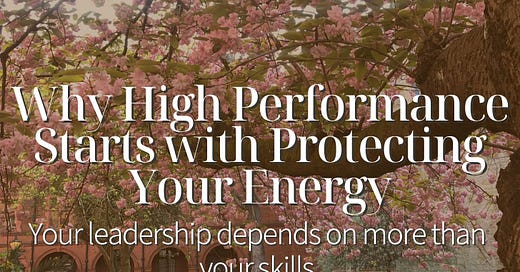Why High Performance Starts with Protecting Your Energy
Your leadership depends on more than your skills.
I met a senior executive for a walk in a quiet London garden a few days ago. It was their birthday; they should’ve been celebrating. Instead, they were exhausted—too tired to gather friends, too wired from work to rest. They’ve been working seven days a week, mostly around the clock. Their sleep has suffered, their exercise routine has diminished, and they feel constant tension.
What’s worse? This has been going on for most of the last quarter, as if it were business as usual. Because in their new organization, it is.
“This is how things work here,” they told me. “The culture and leadership are reactive. Chaotic. Everything is urgent and last-minute.” It’s as though there’s no respect for planning, pausing, or thinking before taking action.
My client could already feel their goal of building a high-performing, values-led team slipping out of reach. Not because they lacked the skills to develop the team, but because their energy was constantly being hijacked.
Yet, the real question they raised was this: How do I not just survive this environment but thrive? How do I lead at my best…here?
This conversation wasn’t new. Most of my client work begins in the same place. Before we talk about leadership, strategy, or influence, we start with well-being because it’s foundational. We can’t move forward when someone is depleted on every level, and most people are more depleted than they realize.
What does depletion look like?
Disconnection from self.
Not knowing how you feel or what you need.
Foggy decision-making or difficulty focusing.
Unclear boundaries.
Diminished capacity to emotionally regulate.
A feeling of being constantly “on,” but never fully engaged.
And an inability to find joy or momentum in the very work that once lit you up.
These symptoms reflect a way of living and working that lacks renewal. Without renewal, performance breaks down.
Why Energy Is the Real Currency of Performance
More than two decades ago, Tony Schwartz and Jim Loehr introduced a radical idea in their HBR piece (and book), The Making of a Corporate Athlete: What if we stopped treating stress as the problem and instead focused on recovery?
They argued that high performers—from athletes to executives—aren’t derailed by pressure but by the absence of recovery.
Their work showed that sustainable high performance doesn’t come from time management or more effort. It comes from managing your energy across four levels:
Physical: the fuel in your body
Emotional: the quality of your inner state
Mental: your ability to focus and direct attention
Spiritual: a connection to purpose or meaning
This multi-level model—what they called the Performance Pyramid—made one thing clear: energy is renewable, but only if we build in cycles of rest and rhythm. Without those cycles, we risk living linear lives: all gas, no brakes.
Sound familiar?
These ideas may have been seeded decades ago, but they haven’t stayed in the past. In The Way We’re Working Isn’t Working Anymore, Schwartz extends this thinking to today’s leaders, urging us to reimagine work not as a never-ending sprint but as a series of cycles that require renewal. The core message remains the same: when we care for our energy—physical, emotional, mental, and spiritual—we unlock capacity, clarity, and impact.
Of course, tending to your energy requires access to time, space, and sometimes support. Not everyone is granted that equally, and many leaders work inside systems that demand more than they give. But recognizing the need is still a powerful first step. Even small acts of renewal can create ripples.
You cannot lead with clarity, creativity, or care if you are exhausted.
You must begin with yourself. Restore what’s been drained. Create renewal cycles that interrupt the leadership sacrifice loop: the long hours you put in, the stress of the job, the relationships you cultivate, and the emotional labor required to lead with steadiness and heart. This is what researchers Annie McKee and Richard Boyatzis call Resonant Leadership.
In renewal cycles, you learn practices to ground, reconnect with yourself and others, and pace yourself. Then, and only then, will you gain access to your full power—to influence others, build trust, and lead change.
The irony is this: the very tools we need to change the unsustainable systems we work inside—clear thinking, boundary-setting, strategic no’s—aren’t fully available to us when we’re running on fumes. It’s not that we don’t know how to lead differently. It’s that we’re too depleted to access the parts of ourselves that can.
One More Truth We Don’t Like to Admit
My client’s environment is not unique. The culture they described? I could write about ten other leaders this month alone: smart, capable, mission-driven people working in systems that reward overextension and mistake constant activity for effectiveness.
That's why we need to reframe the conversation about wellbeing. It’s not about workplace perks, or even just about avoiding burnout.
Well-being is your ultimate power source. And the moment you start protecting your energy, you begin to reclaim your leadership. This isn’t about self-care, which, for most people, isn’t enough of a reason to focus on well-being, but in the name of leading the work you love well. So that you can show up as the version of yourself that can change a room, a culture, a company, or an entire industry. And so you can do the work you came here to do, with clarity, resonance, and longevity.
I know this work isn’t always easy. Many people are navigating systems that reward depletion and punish pause. Tending to your energy can feel like a luxury, but it is necessary. Even small, consistent acts of renewal can change how you lead and live.
So, pause if you’re running fast and beginning to lose the thread. Ask yourself gently:
Where am I leading from—urgency or clarity?
What might shift if I worked from a full tank instead of an empty one?
And what step can I take right now to replenish my energy?
Consider this newsletter permission to start tending to your energy like it matters, because it does. When you're fully charged, you don’t just perform better—you live and love better. And the journey becomes something you actually enjoy.
Until next time, be well!
Thanks for being here. I'm Janine Mathó. Five years ago, I left corporate due to burnout and bereavement. Today, I help ambitious people—executives, founders, leaders, and creatives—reclaim their energy, align with what matters, and create meaningful, lasting success. My goal for the newsletter is that it helps as many people as possible. So, if my work resonates, please share it with others who might benefit. Thank you!
🚀 Want more? My book, Live Your Opus—a revolutionary mindset and method for achieving and sustaining healthy, meaningful success—is coming soon. It’s for ambitious people who crave deeper meaning, fulfillment, and direction but sometimes struggle to break through. It’s The Artist’s Way for the modern professional. Reserve your copy today.
👉 Subscribe to Live Your Opus, my weekly newsletter, here or on LinkedIn, and join 900+ people already redefining success on their terms.
Here’s how I can help you, your team, or your organization to achieve success that feels even better than it looks:
🤝 Work 1:1 with me. Please email me at hello@janinematho.com if you'd like to explore executive coaching for yourself or your team.
📋 Join the waitlist for the second cohort of Project Opus, an invitation-only program for entrepreneurially-minded women. I'll soon announce dates for the second cohort, which will begin this Autumn, and those on the waiting list will receive first consideration.





